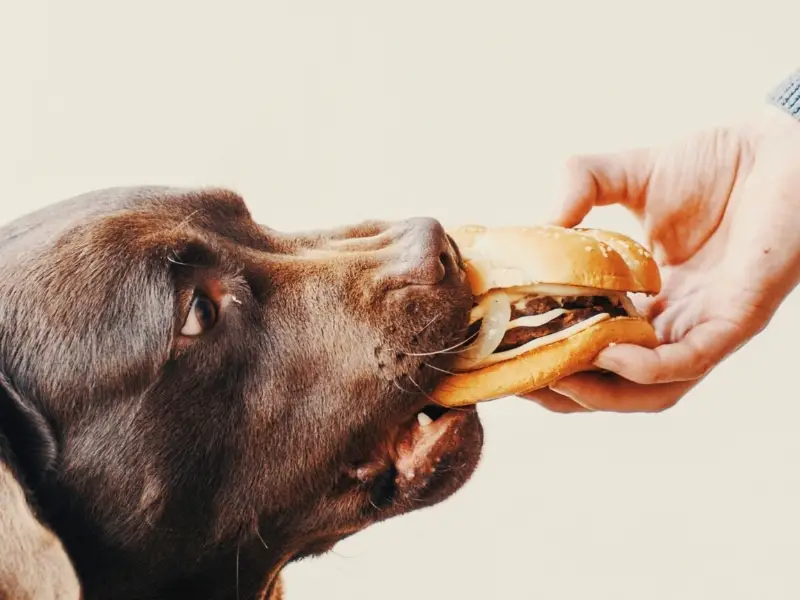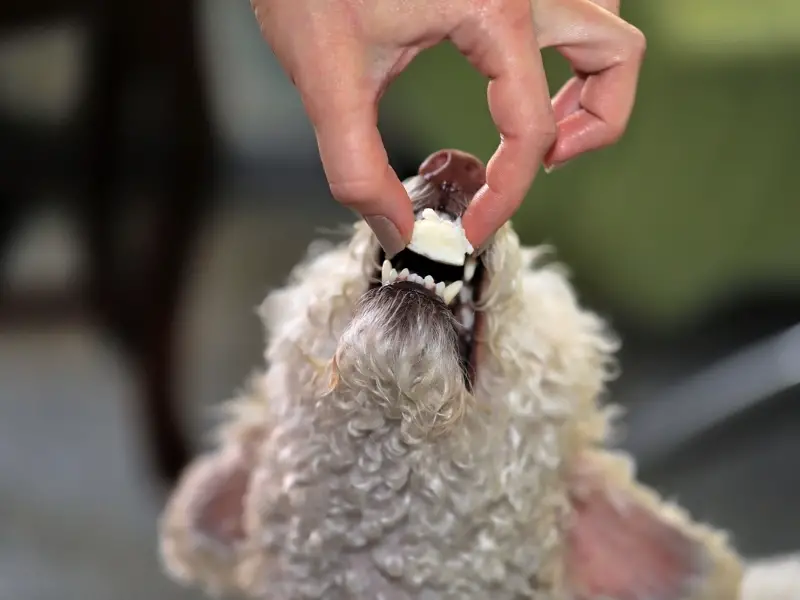Does your dog eye you longingly whenever you are about to eat a chunk of cheese? The truth is, most dogs are crazy about cheese but is cheese bad for dogs?
So, can dogs eat cheese? Dogs can have a bite of cheese every now and then as a high-value treat. While cheese isn’t toxic to dogs, it is high in fat and can cause digestive problems in lactose intolerant dogs. Note, some types of cheese, like blue cheese contain mold that can make dogs very sick and should be avoided.
In this article, we’ll weigh the pros and cons of feeding your dog cheese and help you decide whether or not to include it in your dog’s diet.
Is Cheese Good for Dogs?
Cheese is one of those human foods that are only good when fed in moderation. Most dogs can eat small amounts of cheese, but some dogs can be intolerant of cheese.
Cheese is rich in protein, essential fatty acids, calcium, vitamin A, and B-complex vitamins all of which are good for your dog. However, since cheese has a high-fat content you should offer it sparingly.
Many dogs love cheese, so you can use it as a high reward treat when training your dog complex commands such as recall (source).
Since most dogs gobble cheese within seconds, you can also use it to hide pills whenever your pooch refuses to take their medication.
Benefits of Cheese for Dogs

Cheese can be a healthy snack for your dog, but it can’t be used as a substitute for complete and balanced dog food. Since dogs can eat only small amounts of cheese sparingly, it’s unlikely that your pooch will experience any major health benefits.
With that being said, cheese can be good for your dog and offer valuable micro and macronutrients, such as:
1. Protein
Cheese is an excellent source of protein, which contains amino acids that build muscles, tendons, and ligaments. Low-fat cottage cheese is a type of cheese that is particularly high in protein and can be used as a healthy and tasty treat for your dog.
2. Calcium
All dairy products, including cheese, are rich in calcium that helps your dog’s nerves, muscles, and cells work properly. Most importantly, your dog’s body needs calcium to build and maintain strong bones and a healthy musculoskeletal system.
3. Essential Fatty Acids
Different types of cheese contain omega 3 fatty acids that support healthy skin and shiny coats in dogs. Fatty acids also have anti-inflammatory properties and can be beneficial for conditions such as arthritis, cancer, and cardiac disease (source).
4. Vitamin A
Cheese is a good source of vitamin A, a powerful antioxidant that is involved in several body functions. Vitamin A is necessary for proper growth and development, immune function, and also promotes good eyesight.
Side Effect of Cheese for Dogs

Cheese can be good for your dog, only when consumed moderately as a treat. When fed often and in large amounts, cheese can lead to serious health problems.
Potential risks of feeding cheese to your dog include:
1. Upset Stomach
Even small amounts of cheese or other dairy products can cause gastrointestinal upset in lactose-intolerant dogs. Dogs that can’t break down lactose from the cheese will develop an upset stomach followed by bouts of diarrhea.
If your dog gets diarrhea after eating cheese, it’s safe to assume that they are lactose intolerant. In this case, you should steer clear of any dairy products in the future.
2. Obesity
Cheese has a high-fat count and loads of calories. So, if your dog eats cheese regularly it can easily pack on the extra pounds and might even become obese.
Obesity is a big problem for many dogs and their owners and puts your dog at risk of developing diabetes and heart problems. If your dog is already overweight and needs to shed a few pounds, you shouldn’t give them cheese at all.
3. Pancreatitis
When fed in large amounts cheese can lead to pancreatitis, which can be a potentially fatal condition for dogs. Pancreatitis is caused by a high-fat diet, and since cheese contains a lot of fat, it can easily overwhelm your dog’s pancreas and cause serious problems (source).
How Much Cheese is Safe for Dogs?
Certain types of low-fat cheeses such as cottage cheese, soft goat cheese, and mozzarella are safe for dogs in small quantities. It is best that you use cheese as a treat while you are training your dog.
Like all other treats, cheese should make up to 10 percent of your dog’s daily calorie intake. But due to its high fat and calorie count feed your dog cheese sparingly and only as a special kind of treat.
Lactose Intolerance in Dogs
Just like people, some dogs can’t digest lactose found in dairy products. While cheese contains less lactose than milk, dogs with severe cases of lactose intolerance can get seriously sick even from a tiny piece of cheese.
If you suspect that your dog is lactose intolerant, don’t try your luck by feeding them cheese. Even a small amount of cheese can cause stomach upset and bouts of foul-smelling diarrhea.
If you don’t know whether or not your dog has lactose intolerance, start by feeding them a tiny piece of cheese and observe how their tummy behaves. If nothing happens after a few hours, it’s safe to assume that your dog can digest lactose and eat cheese.
How to Feed Cheese to Your Dog?
If you decide to feed cheese to your dog, pick a low-fat variety like cottage cheese and only feed small amounts. Furthermore, make sure that the cheese doesn’t contain any herbs, onions, or garlic since they are toxic to dogs.
Popular ways to feed cheese to dogs are:
- Cut cheese in small cubes and offer as treats
- Use a tiny piece of cheese to conceal your dog’s pills
- Shred cheese and use it as a topper for your dog’s food
Conclusion
Tasty and full of protein, cheese can be a healthy snack for dogs and is best used as a high-value treat. Since cheese is high in calories and fat, feed it moderately and only once in a while.
Overweight dogs shouldn’t eat cheese, since it’s loaded in calories and can cause a weight gain. The same is true for lactose intolerant dogs, who can develop severe diarrhea after eating just a tiny piece of cheese.
If you decide to feed cheese to your dog, always choose low-fat varieties and steer clear from blue cheeses or any types that contain herbs, garlic, or onion, since they are toxic to dogs.
Related Articles:


0 Comments